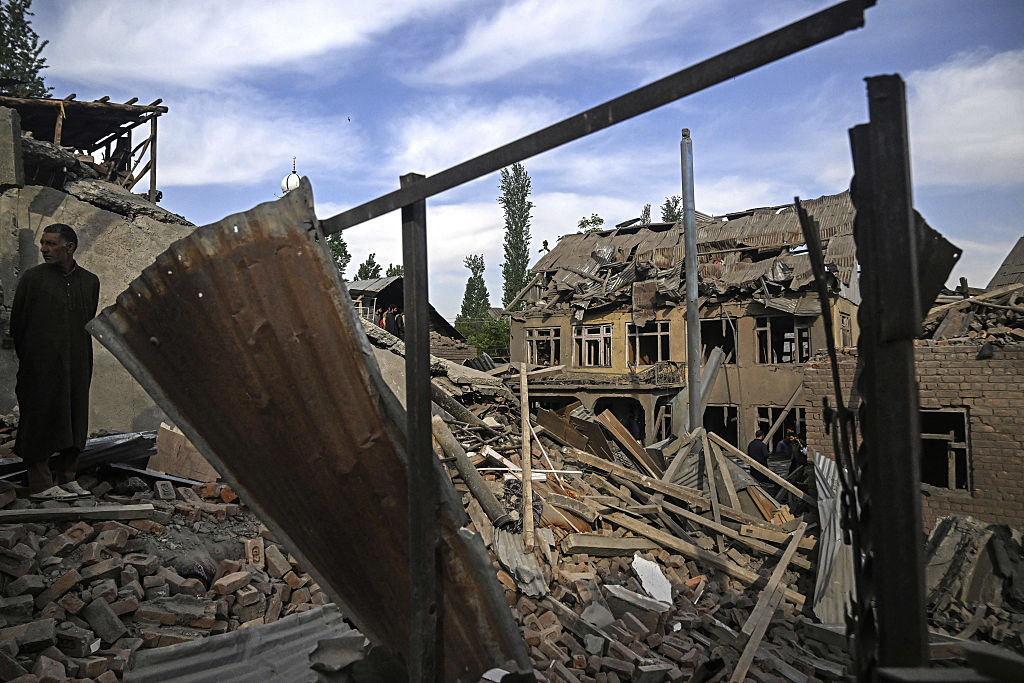
"We stopped a nuclear conflict, I think it could have been a bad nuclear war, millions of people could have been killed, so I'm very proud of that," President Donald Trump told reporters on May 12.
Proud he should be. Although New Delhi refuses to acknowledge Washington's role in brokering a ceasefire between India and Pakistan, the Trump administration was nonetheless instrumental in stopping fighting that could have escalated, as Newsweek wrote, "to the brink of all-out war."
On April 22, gunmen murdered 26 Hindu tourists and others at Pahalgam, in Indian-controlled Jammu and Kashmir. Pakistan also claims that territory.
New Delhi blames Islamabad for harboring militants who staged the attack. Pakistan denies involvement.
India retaliated for the murders at Pahalgam by, among other things, launching Operation Sindoor on May 7 against known terrorist sites in Pakistan. The Indian military strikes, reports Georgetown University's Aqil Shah writing in Foreign Affairs this month, "ranged far beyond Pakistani-administered Kashmir into Punjab, Pakistan's heartland, eventually hitting not just the facilities of militant groups but also military targets, including airbases."
"In recent decades," Shah also notes, "fighting has been mostly confined to the border region around the disputed territory of Kashmir."
Of particular concern, Indian strikes targeted two installations linked to Pakistan's nuclear weapons arsenal: the Nur Khan Airbase, close to the country's nuclear-command headquarters, and the Mushaf Airbase, near a nuclear storage site.
After these strikes, Pakistan's Prime Minister Shehbaz Sharif called an emergency meeting of the National Command Authority, which has the authority to approve the use of nuclear weapons. This, Shah wrote, sent a "calculated message to India—and everybody else."
"These Indian attacks on the airbases could have been ones for the history books," Blaine Holt, a retired U.S. Air Force brigadier general, told Gatestone. "This particular inferno could have gone nuclear."
The Trump administration, which had previously displayed a lack of interest in the conflict, then quickly intervened and brokered a ceasefire. The about-face showed Islamabad that nuclear threats can move the world's most powerful state to act.
Has the danger now passed?
Undoubtedly not.
Indian Prime Minister Narendra Modi recently said Operation Sindoor has not ended. For its part, Pakistan has threatened to resume hostilities as well.
There is, consequently, a dangerous dynamic in South Asia. In India, after a series of horrific attacks over this century, anger is driving policy. New Delhi charges that Pakistani terror attacks have taken more than 20,000 Indian lives in the past four decades.
In Pakistan, the possession of nuclear weapons has made a military-run regime bolder. "Nuclear deterrence can reduce the probability of a full-scale conventional war, but it can also breed instability by widening the space for lower levels of conflict, including skirmishes and terrorism," writes Shah. "In other words, the possession of nuclear weapons may have incentivized risky confrontations that pass just below the ambiguous nuclear threshold."
Pakistan, in short, saw its possession of nukes as giving it more room to assault a larger and more powerful India. Nuclear weapons are always on the minds of Pakistani officials. In late April, for instance, Defense Minister Khawaja Muhammad Asif declared, in a comment to Reuters, that his country would consider using its most destructive weapons if "there is a direct threat to our existence."
At around the same time a Pakistani foreign ministry spokesperson made a similar threat by warning India that Islamabad might respond "with full force across the complete spectrum of national power."
"China turned Pakistan into a nuclear-warhead-making and long-range-solid-fuel-ballistic-missile-making existential threat to India," Richard Fisher of the International Assessment and Strategy Center told Gatestone after the ceasefire.
"Pakistan, thanks to China, is a nuclear-armed state the Chinese now use for their own highly dangerous purposes," Peter Huessy of the National Institute for Deterrence Studies tells this site. "The U.S. doesn't have a new paradigm to deal with this tactic so must begin building Golden Dome and theater nuclear systems for protection."
Beijing armed Pakistan to keep India, which the Communist Party saw as a rival, off-balance, but in the process China has made Pakistan's militant Islamic regime a threat not only to India but also to the rest of the world.
The United States, Huessy says, has yet to develop a deterrence strategy to deal with the new reality.
The recent crisis taught the international community one thing: Pakistan did not have to detonate one of its nuclear warheads to shake the world. Now, an emboldened Islamabad will almost certainly hit India again.
"The world was lucky this time," says Holt.
Yes. Nukes are supposed to moderate national leaders and make them cautious. When it comes to India and Pakistan, however, the opposite now looks true.
Gordon G. Chang is the author of Plan Red: China's Project to Destroy America, a Gatestone Institute distinguished senior fellow, and a member of its Advisory Board.


